Literacy training targeted for women has filled classrooms in the illiterate countryside of Central African Republic. Excitement spreads as rumor goes that the mother next door has learnt to read.
A woman dressed in an eye-catching blue kaftan is standing in front of the class. A group of women both approaching and past middle age repeats syllables after her in one voice. A wooden plank serving as a pointer taps a determined rhythm on the chalkboard.
The woman is Damaris Sarape, 35, instructor of a literacy group for adult women. On the surface, Damaris is no different from her students. Her everyday life is the same as that of her peers; she lives in one of the two-room clay houses built next to one another, and keeps her children fed by farming.
However, there is one thing that sets her apart, and makes the other women follow her with admiration as well as address her using the respectful Madame. She knows how to read.
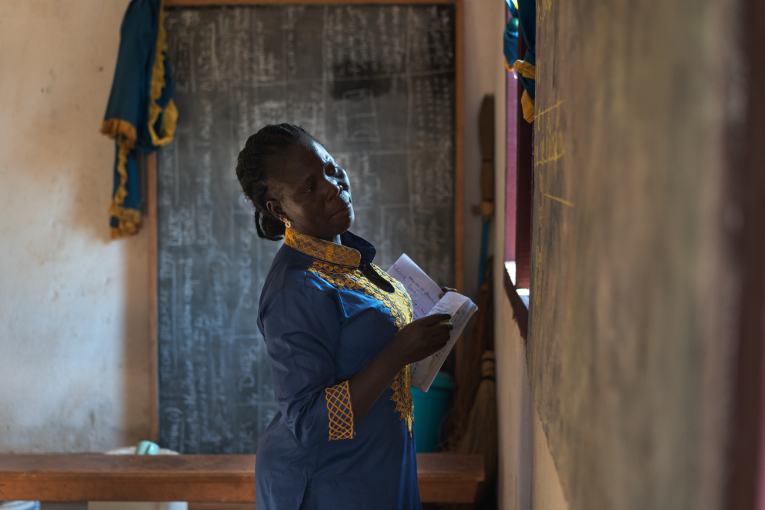
Damaris teaches the women in her neighborhood with enthusiasm and determinism.
Being able to read boosts sense of self-worth
Two years ago, when Finn Church Aid asked women living in the remote northwestern parts of the Central African Republic what kind of support they needed in their day-to-day life, among the first things that the women mentioned was wanting to learn how to read.
Based on these wishes, a Women’s Bank project was born, founded on the idea of improving the quality of life of women in the Bozoum region by offering them education in literacy and numeracy, entrepreneurship, and peace work.
Before, I didn’t even know how to spell my own name, but now I do. It feels wonderful.
Factbox
- Central African Republic is one of the most fragile states in the world. Learn more here.
- Anna Koskivuo, volunteer with Teachers Without Borders, together with a representative of the Central African Republic Ministry of Education, trained 18 literacy educators, who teach groups of 15 to 25 women three times a week
- The Women’s Bank project runs from 2018 to 2020 and incorporates subsistence, education, and peace work
- All activities are held in the women’s native language, sango
- The project benefits a total of 450 women
”In our community, we have many mothers who don’t know how to read, count, or write. These women deserve better opportunities to be in charge of their own life,” says Damaris, literacy instructor in one of the women’s groups.
Last year, she saw the Women’s Bank’s advertisement for recruiting literacy instructors, applied, and was selected. Damaris is motivated by seeing women she knows gain self-confidence through learning to carry out simple calculations and write their own name.
”If we had been allowed to go to school earlier, we wouldn’t be illiterate now. Before, I didn’t even know how to spell my own name, but now I do. It feels wonderful,” says Nafissa Yaya, 45, mother of six.
The women come from modest circumstances. Many of them had parents who chose to keep their daughters home to do housework, and arranged for them to marry young instead of sending them to school.
However, literacy and numeracy skills are strongly connected to coping with day-to-day life.
”Sometimes I get conned at the market, because I don’t know how to count or how much the change should be. I want to learn how to count in order to better plan my family’s finances and to be able to set aside some savings,” Nafissa continues.
Women and girls are often left outside education. According to an estimate by UNESCO (2010), only 24 percent of women in the Central African Republic know how to read.
Less than half of the adult population in Central African Republic is literate. The number is even lower what comes to women; according to UNESCO (2010), only 24 percent of Central African women can read.
Prolonged conflict and unstable history have resulted in poor levels of education. The influence of the former French colonial administration is still visible today; for example, the official language of instruction in Central African Republic is still French, even though the majority of the population, especially in remote areas, does not master the language. Children do not learn at school if they do not understand what the teacher is talking about.
Women’s Bank’s literacy training is held in sango, which is the primary language spoken in Central African Republic. Studying in sango has sparked enthusiasm and hope among the women about learning still being possible.
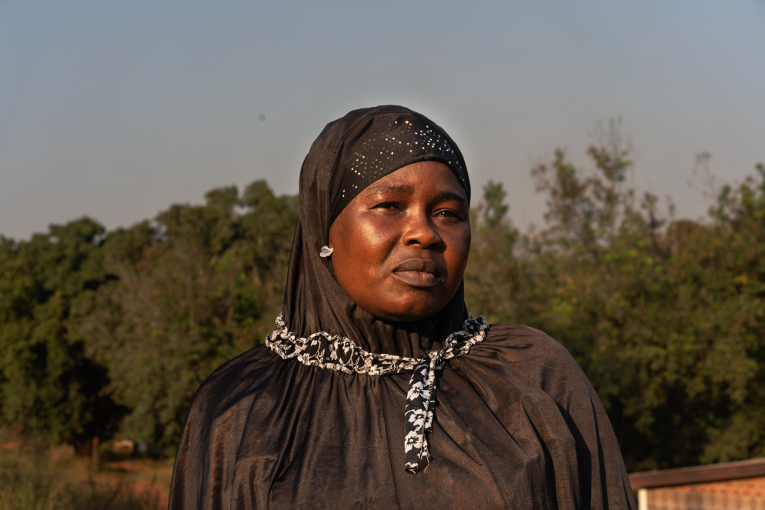
Mother of six, Nafissa, hopes that the training will help her find a job.
Hands full with work
Bozoum is a sleepy rural town with about 20,000 inhabitants, where everyday life is simple but filled with work.
When the sun rises above the hills of the town early in the morning, Damaris is already up. She starts the day by sweeping the ground in front of her home, just like the other women in her neighbourhood. It is important to keep one’s own yard looking tidy.
In Central African Republic, women are in charge of taking care of home and children. In the morning, the women walk together to go and work in the fields, and during the day, they sell their crops by the side of the road in order to provide for their families. Many have husbands working in the gold and diamond mines far outside of town. The fathers come home once a month, sometimes once every two months.
Although rich in natural resources, Central African Republic has had a rocky road to travel. The civil war that broke out in 2013 affected Bozoum as well.
Even though the situation is stable at the moment, many are worried about the future.
”There is still unrest in the regions surrounding the town. Only one fifth of those who ran from the war have returned,” says Damaris.
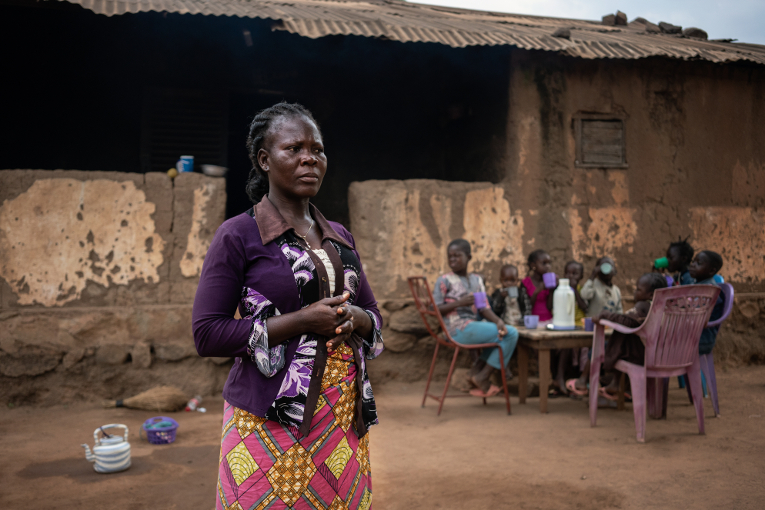
In addition to having two jobs and her own children to look after, Damaris takes care of the children of her brother who works at the mines located far away.
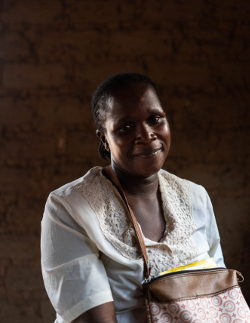
Laole after a literacy class.
The decreased population has affected the market as well.
”Business is not what it used to be. My family’s subsistence is on the line. I wish I was able to sell more,” says Laole Léocadie, 40, who recently became a widow.
It is not easy to bring food on the table; Laole provides for her six children by working in the fields. The youngest of the children is only two years old.
After her husband was taken away by an illness, the women’s group has become even more important to Laole.
”With the father of my children no longer with us, the other women bring security. It’s easier to have a savings fund and to go and work in the fields together”.
Hope in the middle of adversity
Alice Issoia, 47, has a kind face and a slightly sad smile. When Damaris writes on the chalkboard in sango, she follows attentively. Even Alice recently became a widow.
”My life has been hard since my husband died. I have to take care of our children and finances alone. Sometimes, when my children are fighting and money is tight, I don’t know how I’m going to cope.”
When Alice heard that there was going to be literacy training in her town, she felt her opportunity had come. Unexpectedly, learning to read and write has brought newfound joy into her days.
”The literacy training has given me something else to think about and offered me a moment’s escape from everyday reality. Now I have something of my own to focus on every now and then.”
Like many of her peers, Alice is illiterate. Alice lost her mother when she was still a child, so there was no one to send her to school.
”I go to Bible group at the church, but I don’t know how to read the Bible. I’m especially glad that I finally get to read and write in my own language, sango”.
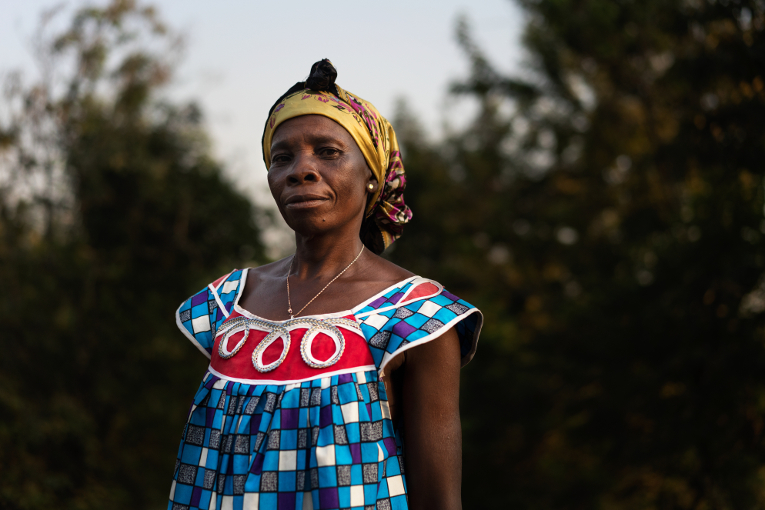
Alice has gotten newfound joy from learning to read.
Admirable perseverance
Despite the hardships, these women do not need pity. What they do need is tools to build a better life, piece by piece, using the same perseverance that has brought them this far.
”The women have showed their interest in the project, and they are committed to it. Now, whether we help them in the longer run is up to us,” says Timothee Yarawandi, coordinator for Women’s Bank.
The possibility of change even encourages the women to make plans for the future.
”I hope that this education can make up for never having been able to finish school. I can use the diploma I get from the training to prove that I can read and write. I hope it helps me find work. I would like to work as a waitress, for example,” Nafissa plans.
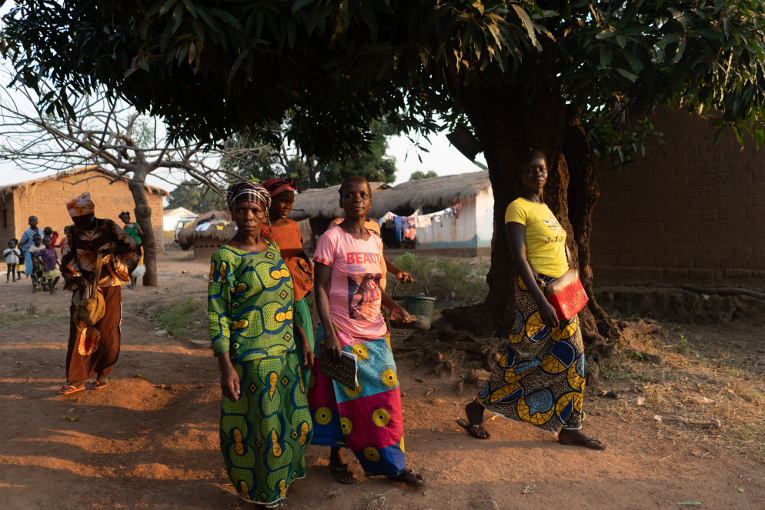
Women walking home after a literacy class has ended.
The evening sun paints the walls of the classroom golden. The two-hour literacy class is ending. Books are packed into bags, chairs are put back in their place. The women walking out the open door look more determined than the ones who walked in earlier.
Text: Elina Kostiainen
Translation: Leena Vuolteenaho
Photos: Fredrik Lerneryd
Before, as many Jordanians, we used to take up a two-hour drive to Syria on weekends to enjoy the green nature, stay by the coast, purchase good quality goods, and come back home. After nine years of war, it took us a five-hour drive to reach Damascus, but nothing was the same anymore. The border barely exists, the green road is full of damaged buildings on both sides, and there are countless checkpoints.
I visited Syria as part of an educational project that FCA Middle East office is implementing in rural Damascus. The war has been put to rest in most of the governorates of Syria, except some North-West areas like Aleppo and Idleb.
Our destination, the Old Town of Damascus was, was thankfully kept safe during the conflict. The old streets, the souqs, the mosques and the churches are still standing, witnessing sadly the damage of other old towns. There is not much war remains inside Damascus, and life seems normal. The city is buzzing with people, despite that you can definitely sense the pain and the suffering in people’s eyes, voices, and stories.
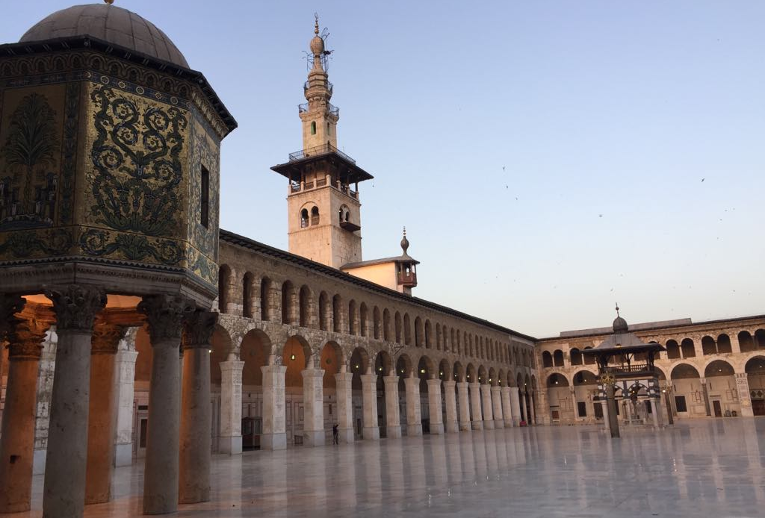
Umayyad Mosque in Damascus
During my visit, I facilitated a Training of Trainers (ToT) for 40 teachers and administrators, who despite all the obstacles and the frustrations came all the way to participate in the training actively, energetic and full of life. The training mainly focused on teacher competencies, planning for teaching, modern teaching strategies, evaluation strategies, classroom management, and facilitation techniques.
The ideas, the discussions, and the laughs we shared in the 6 days training are unforgettable. I was keen to join the participants at their tables during the breaks, and listen carefully to their stories; the woman who lost her father, the man whose house was destroyed, and the families who were forced to leave their hometowns and start over a new life from scratch.
“He was my only brother, but he was killed by a land-mine”, Diana describes.
During the training, the one and only question that kept racing through my mind: “Is war worth it?”
Over 2 million children – over one third of Syria’s children – are out-of-school and 1.3 million children are at risk of dropping out.
Nine years now of the prolonged conflict in Syria, and the needs are still huge, severe and demanding. As the number of IDPs estimated to be 6.2 million, some areas became overcrowded, resulting in the drainage of resources to the point that over 8 in 10 people in the country now live below the poverty line. As a sample of those areas, we visited Jaramana and Sahnaya in rural Damascus.
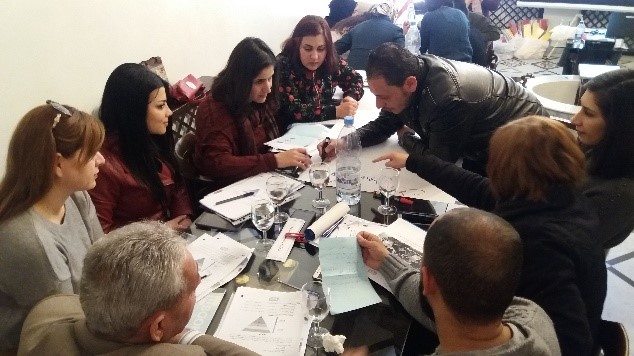
ToT training in Damascus
During our trip to Jaramana, my colleagues and I conducted field visits to the institutes that provide informal education for dropout students. They also provide remedial classes for 9th and 12th grade students to help them pass the national exams. Gladly, I had the chance to conduct coaching visits to some classes, in the purpose of observing and providing feedback. It is said: “Never underestimate the power of dreams!” That is exactly what is left for those children, dreams of a better future, where no more war or killing around.
In one class that I was coaching, the teacher was fully engaged in teaching the students a poem about freedom and patriotism. He asked all the questions, they replied with all the perfect answers, but I wonder if one of those students had a peek at the window, what he would think!
During that class, the one and only question that kept racing through my mind: “Is war worth it?”
Erbin: A tale of a devastated city
Later, the car moved slowly away from Damascus. Gradually, the noises started fading away until we found ourselves entering a world of silence; a town with no inhabitants, streets with no cars, even no birds, dogs or cats. It was more like a ghost town! And so we were informed that we arrived to what was left from Erbin, in East Ghouta.
In Erbin, you may drive for more than 10 minutes searching for a human being, or any sign of life, or even a non-damaged house, but you find nothing but destruction. In 2018, Erbin was exposed to restless heavy bombardment and raids for months, even hospitals and schools were repeatedly hit. One of the schools was used as a shelter. School activities were suspended for long period due to safety and protection reasons! According to OCHA report 2019, 10076 people are in need in Erbin.
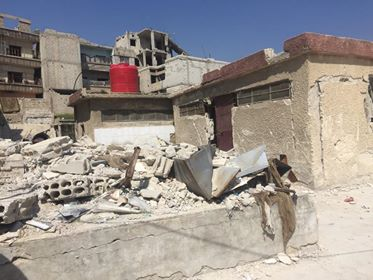
“The teachers haven’t been paid for a year now, but we show up every morning for the sake of those guiltless children”, a school principal explains.
FCA supports the rehabilitation of two schools in Erbin. Classrooms and washrooms will be renovated and walls will be painted.
On the same trip, we visited a vital center that St. Ephrem Patriarchal Development committee (EPDC) – FCA’s local partner – runs. It provides psychosocial support and informal education. The desire to live in better circumstances was a powerful motive driving everyone to work like busy bees, the hope of a better future could be easily sensed in every corner, it was contagious!
Also in Erbin, the same question kept racing through my mind: “Is war worth it?”
The trip came to an end, I went back home safe. The memories, stories and feelings I carried with me are irreplaceable. The visit was overwhelming, and it was only 12 days long. What about the Syrians, who live amidst those memories every single moment of every single day?
In Syria, one thought kept racing through my mind: “Is war REALLY worth it?”
Heba Suleiman
The writer works as a regional education adviser for Finn Church Aid
Career guidance and counselling has generated promising results in decreasing school drop-out rates and giving youth means to find employment in Cambodia. The Swedish International Development Agency, SIDA, has allocated 23,000,000 SEK (2.2 million in euros) to continue the provision of career guidance and counselling in secondary schools and job centers in Battambang and Banteay Meanchey.
The three-year project “Career Guidance and Counselling in Secondary Schools – the bridge to employment” is jointly implemented by Swedish Public Employment Service (SPES), Finn Church Aid (FCA), Ministry of Education, Youth and Sports and the National Employment Agency in Cambodia.
The estimated number of students benefiting from the project is 10 000.
The project aims to increased labour market participation of Cambodian youth by increasing their awareness of the wide variety of professions and available study paths they need to take in order to find employment. In addition, youth’s ability to recognize their skills is strengthened in order for them to aspire careers they find motivating.
“Cambodian youth, like youth everywhere in the world, has tremendous potential which is currently not used in the best possible way for their own benefit, or for the benefit of their families and communities. It is important that today’s youth have a good education, are able to gain a decent living and grasp the opportunities in a fast changing world. This is where career guidance and counselling comes into the picture”, says Saara Lehmuskoski, FCA’s country director in Cambodia.
Nearly two thirds of the Cambodian population are under 30 years old. For Cambodia’s economy to continue growing, it needs motivated young professionals who have relevant skills and education.
The project will combine local knowledge with the know-how from Finland and Sweden through collaboration with different governmental and non-governmental actors. It is a continuation of an earlier career guidance and counselling project that was implemented by the same project partners.
“In FCA we look forward to taking the good work further with new Swedish government funding, and adding collaboration with the National Employment Agency in Cambodia, the Swedish Public Employment Service and Cambodian Teacher Education Institutions. We will be able to reach thousands of new students and establish sustainable structural solutions for Cambodia”, Lehmuskoski continues.
FCA has developed Cambodia’s career guidance and counselling system in collaboration with the Cambodian Ministry of Education, Youth and Sports since 2014. The first-ever career counselors in the country were trained in 2015-2016 by making use of the expertise of FCA’s Teachers Without Borders network.
Today, career counselling and guidance is incorporated in the national curriculum, and more counselors are continuously being trained in cooperation with the Cambodian Ministry of Education. The new project will lay the basis for expanding career guidance and counselling services across Cambodia on an even larger scale.
Finn Church Aid (FCA) is the largest Finnish organization in international aid. FCA has been working in Cambodia since the early 1980s by providing humanitarian aid and supporting the development of livelihoods, quality education and youth participation.
Arbetsförmedlingen – the Swedish Public Employment Services – is a government-funded agency working on behalf of the Swedish parliament and government.
Finn Church Aid, University of Helsinki and Inter-agency Network for Education in Emergencies (INEE) had the honor to host the first ever high-level Education in Emergencies -seminar in Finland on 14th May. Education experts around the world gathered in Helsinki to discuss how education in emergency settings could be made more accessible for all, and how we could step up our efforts to achieve sustainable development goals on time.
It has been widely agreed that sustainable development goals, SDG’s, cannot be achieved by 2030 without ensuring access to quality education for all. Nevertheless, the reality on the ground is still very different from the ideals set out in policy papers, not to mention emergency settings, where inclusive education is far from the targets.
Manos Antoninis, the director for the Global Education Monitoring Report at UNESCO, was one of the renowned education experts who shared his insights in Helsinki on how we could better plan and implement inclusive education programs in emergency settings, if we are to achieve sustainable development goals by 2030. According to him, inclusion should be seen as an inherent and cross-cutting element in all education programs.
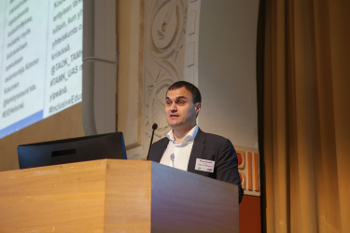
Manos Antoninis delivering a key note speech on why we won’t reach SDG4 without inclusive education.
”Inclusive education needs to be seen as a general approach. We need to see a change in attitudes, beliefs and values towards including everyone in education, only then we have actually genuinely achieved SDG4”, Antoninis stated in his key note speech at the beginning of the seminar.
For the moment, only two percent of girls in the lowest income countries complete secondary education. As outlined in the Agenda 2030, by year 2030 we should live in a world where all girls and boys complete secondary education.
”It is not going to be possible, unless something dramatic changes”, Antoninis continues. ”We still face remarkable challenges, when it comes to e.g. learning environments; 1 in 4 schools in sub-Saharan Africa do not have any sanitation facilities, which is a major obstacle for girls to complete school.”
”Nothing about us without us”
First of all, what does it actually mean that education should be inclusive?
By UNESCO’s definition, inclusive education is “a process of addressing and responding to the diversity of needs of all learners through increasing participation in learning, cultures and communities, and reducing exclusion from education and from within education.”
In practice, this means that different needs, such as those originating from disabilities, language, gender or age, should be taken into account and addressed when planning and implementing education activities.
Tuomas Tuure, Development Coordinator at the Threshold Association, shared his insights on addressing the needs of disabled people in planning and implementation of education activities.
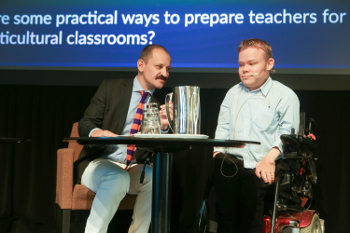
Peter Hyll-Larsen and Tuomas Tuure.
”In no other group is participatory approach as important as with people with disabilities. Even in countries like Finland, disabled people themselves participate surprisingly little in decisions concerning their policies, their way of life or even their own lives. This is a group where participation is actually the key” Tuure stressed.
According to Tuure, we should first and foremost acknowledge that when it comes to people with disabilities, the best knowledge comes from disabled people themselves. Furthermore, it comes particularly from people with disabilities in that particular area and context.
On the right track with the SDG’s
Susan Nicolai, Acting Head of Programme at Overseas Development Institute (ODI), pointed out the essential difference between Millennium Development Goals (MDG’s) and Sustainable Development Goals (SDG’s) from the point of view of inclusion; during the era of the MDG’s, the levels of inequality rose, whereas the ambition of the SDG’s is more transformational.
”The MDG’s showed significant progress on a range of issues and education, however, when one looks behind the numbers in terms of where progress occurred, the gains went to those who were more well-off. On the contrary, the ambition of the SDG’s is genuinely transformational; they explicitly make a commitment to the focus on ’Leave no one behind’”, Nicolai underlined.
It can be concluded that progress has been made, but a lot of work remains to be done in order to include everyone.
Turning the crisis into an opportunity by providing youth vocational education
Tomi Järvinen, director for International Cooperation at Finn Church Aid, stressed the importance of vocational training and accredited education as a way of including youth who are living in crisis-affected areas.
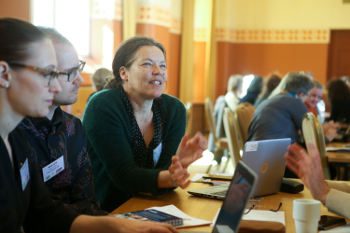
Seminar participants discussing in buzz groups.
”In every crisis there is also an opportunity. Waithood can become an opportunity to gain a skill, even a degree, that will then lead to an opportunity in the future”, Järvinen stated while stressing that we need to find new ways of giving young people relevant vocational training in refugee settings.
Furthermore, while introducing an example of accredited education provision in a refugee context, FCA College, Järvinen stressed that we need to emphasize that when possible, education should be accredited in order to provide access to lifelong learning.
”Continuous learning is also a life-saving activity. We need to focus on the quality and relevance of education, not only access”, Järvinen concluded.
Finally, Satu Santala, Director General at the Department of Development Policies at Ministry for Foreign Affairs in Finland, presented the key recommendations of the ”Stepping up Finland’s Global Role in Education” -report, which was prepared last year as a commission of the Ministry for Foreign Affairs by Dr. Ritva Reinikka, Professor Hannele Niemi and Mr. Jukka Tulivuori.
The report recommends that Finland takes a more active role in addressing the learning crisis in developing countries.
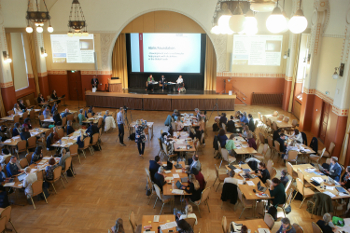
The seminar took place in Paasitorni, Helsinki.
”Finland has one of the best education systems in the world, but we haven’t really cracked the nut on how we can share this expertize, and how we can do more and deeply engage with international partners on sharing our own experience”, Santala said.
Finland has a lot of education expertize in the form of research institutions, authorities, civil society and private companies, however, more cooperation and partnerships are needed in order to put all that knowledge into use.
Nonetheless, Santala is optimistic about the way forward.
”There is a strong uptake within the Finnish society for this topic. We have made the report very visibly heard and we have a good sense that it has been well picked up. Now it is very much upto the new government – it remains to be seen how much they will be ready to devote to global development.”
Text: Elina Kostiainen
If you missed the seminar, watch it here.
Links to individual sessions:
Welcome and introductions, Jouni Hemberg, FCA; Arto Kallioniemi, University of Helsinki; Dean Brooks, INEE
https://youtu.be/iNBeMkyHFTY?t=941
Introduction to opening roundtable
https://youtu.be/iNBeMkyHFTY?t=1608
KEYNOTE: Manos Antoninis – “Why we won’t reach SDG4 without Inclusive Education”
https://youtu.be/iNBeMkyHFTY?t=1803
KEYNOTE: Susan Nicolai – “Why we won’t reach SDG4 without Education in Emergencies”
https://youtu.be/iNBeMkyHFTY?t=2889
EXAMPLE: Bente Sandal-Aasen – “Using INEE Minimum Standards and tools for connecting EiE and the SDGs”
https://youtu.be/iNBeMkyHFTY?t=3776
Inclusive education in emergencies – Challenges and solutions
https://youtu.be/iNBeMkyHFTY?t=4037
KEYNOTE: Kimmo Kosonen – “Language in Education in Emergencies”
https://youtu.be/iNBeMkyHFTY?t=4192
EXAMPLE from the field by Barbara Moser-Mercer, InZone Geneva
https://youtu.be/iNBeMkyHFTY?t=5031
KEYNOTE: Tuomas Tuure – “Disability in Education in Emergencies”
https://youtu.be/iNBeMkyHFTY?t=6509
EXAMPLE from the field by Gregory St. Arnold, Jesuit Refugee Services
https://youtu.be/iNBeMkyHFTY?t=7665
EXAMPLE from the field by Ronit Cohen, Safe the Children
https://youtu.be/iNBeMkyHFTY?t=8114
KEYNOTE: Tomi Järvinen – “Youth in Education in Emergencies”
https://youtu.be/iNBeMkyHFTY?t=9313
EXAMPLE from the field by Sonia Gomez, Norwegian Refugee Council
https://youtu.be/iNBeMkyHFTY?t=10247
PANEL DISCUSSION: “Inclusive Education in Education in Emergencies”
https://youtu.be/iNBeMkyHFTY?t=15663
PRESENTATION of Finland’s Stepping Up report by Satu Santala, Finnish MFA
https://youtu.be/iNBeMkyHFTY?t=21026
PANEL DISCUSSION: “Stepping up commitments for inclusive education in emergencies – the role of funders, governments and agencies”
https://youtu.be/iNBeMkyHFTY?t=21675
CLOSING: Jouni Hemberg, FCA
https://youtu.be/iNBeMkyHFTY?t=25469
Accredited education is in high demand among refugees. A new pilot project sees 32 learners graduate with EU-certified education that opens unforeseen doors for the future.
Rwamwanja refugee settlement rarely experiences traffic jams, but today the main road is packed. Over 600 youth dressed in graduation gowns march towards a brighter future, bursting with pride.
Their graduation from FCA’s Business and Vocational Education Training Center has gathered an additional crowd of followers and special guests, even from the highest level of the Ugandan government.
“With this experience, I hope I can one day find somewhere to study”, says Rachel Ngenge Binwa, 18.
The Training Center has been running since 2015, but today’s graduation marks the first time that part of its graduates receive a diploma of global significance. Rachel is one of 32 students receiving a Finnish diploma in micro-entrepreneurship. During the ceremony, she is mentioned as one of the most successful learners.
“I developed interest in starting poultry farming, and at the end of the training my business was up and running”, Rachel says proudly.
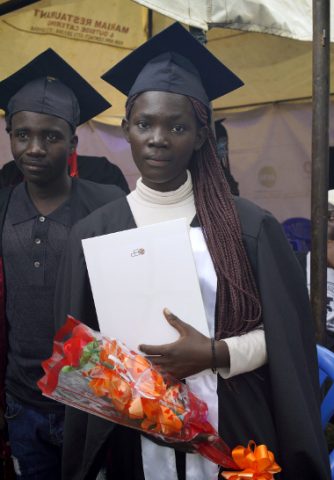
Rachel studied agriculture in the Business and Vocational Education Training Center before enrolling in the micro-entrepreneurship program. Now she has EU-certified secondary education.
The training programs for the Finnish diplomas build on needs and requirements of the private sector so that most find employment. Their competence has been assessed according to standards developed by the Finnish National Agency for Education, under a programme called FCA College.
The college was co-founded by Finland’s largest organisation for development cooperation Finn Church Aid (FCA) and the international education and training provider, Omnia Education Partnerships Ltd (OEP).
“Diplomas are recognised within the EU and open doors to applying for higher education even abroad”, says FCA College’s programme manager Ville Wacklin.
However, the immediate aim is that youth receive a strong endorsement for their actual skills.
“The education provided by development actors has mostly been informal, although most need accredited vocational education that leads to opportunities for decent livelihoods”, Wacklin continues.
There are more refugees than ever, and only about 20 percent of them have an access to secondary education. The challenge grows when most of the refugees are youth, whose futures are at stake.
Almost 70 percent of Rwamwanja’s 70 000 inhabitants are youth, and the situation is similar in other refugee settlements. This training helps them avoid a vicious cycle of unemployment and desperate ways of coping, like crime or radicalisation, Wacklin says. The program is also open for vulnerable Ugandan youth.
Already an overwhelming part of over a thousand learners that previously graduated from the training center have found employment. The Finnish diplomas for micro-entrepreneurs take learning to the next level.
Being able to access meaningful and recognized education during their displacement equip refugee youth to reconstruct their societies, when the time comes to return home.
“Every generation must have a fair chance to realise their dreams and contribute to national development. These diplomas give youth self-reliance and paths to a future, wherever they are and wherever they go.”
Text: Erik Nyström
Photos: Michele Sibiloni
Finn Church Aid (FCA) exports Finnish vocational diplomas to Uganda in cooperation with education export company Omnia Education Partnerships (OEP).
The diploma in question is an official Finnish vocational diploma, equivalent in its requirements to a Finnish secondary degree diploma.
The training programme is currently provided at a refugee settlement in Uganda. The first group obtaining Finnish entrepreneurship diploma at Rwamwanja refugee settlement are graduating on March 28, 2019.
There are more refugees in the world than ever, and it is estimated that only one in five will receive a secondary degree education. The average length of displacement is 20 years.
“What makes this programme exceptional is the fact that refugees are able to obtain a diploma while they are displaced, which helps them find employment already during displacement. A secondary degree education that is offered in crisis areas decreases dependence on aid and provides support where it is most needed”, says Tomi Järvinen, Director of International Cooperation at FCA.
In Uganda, FCA and OEP currently provide vocational diplomas in entrepreneurship. In the future, the plan is to also provide vocational qualification in education and instruction. The programme welcomes refugees as well as Ugandans to participate in the training.
Regina Meta, 18, fled to Uganda from Congo with her mother and sister in 2016, and is now studying in the Finnish entrepreneurship programme. With confidence gained from the programme, the young woman has opened her own hair salon, which is now among the most popular in the refugee settlement.
“Hairstyling has always been my passion. Thanks to the programme, I have learned a lot, especially about how to interact with clients. These days, I get lots of new clients based on the recommendations by my old clients”, Regina says.
Thanks to legislation that came into force in Finland last year, all vocational education providers have the opportunity to export vocational education, either as complete diploma programmes or as parts of them.
The reform is an important step forward for the export of Finnish education, and also a new form of sustainable development cooperation. It reinforces the ability of refugees to pursue their livelihood.
The project is a pilot that can be later used to provide vocational training in other refugee settings.
More information:
Ville Wacklin, Project Manager, tel. +358 40 719 0592
Tomi Järvinen, Director of International Cooperation, tel. +358 40 641 8209
Read more about FCA College here.
Translation: Leena Vuolteenaho
Students appreciate the new subject in Cambodian schools. FCA, together with the Cambodian Ministry of Education, Youth and Sport introduced career counselling and guidance in a country that needs its young to study and find their place in working life.
Vattey Oeur’s list of favourite subjects is impressive. ”I like mathematics, physics, history, khmer and career counselling,” she says.
The calm, slender 16 year-old, who is in her first year at high school, had always found it easy to follow mathematics lessons at school. Making a study plan and managing her time, skills that she learned at career guidance and counselling lessons, brought her mathematic abilities to an even better level – and the same has happened with other subjects, too.
“Before I only studied at school, but now I always revise at home, too. This has really improved my learning. I have learned how to set goals, make a study plan and I also know about different occupations for my future,” she says.
After learning career guidance and counselling in secondary school from grade seven onwards, Vattey decided to continue to high school.
“Career counselling has also made me know myself very well; what kind of a person I am and what I’m able to do. And it gave me knowledge on how to choose an occupation that fits my capacity.”
Vattey’s parents are farmers and vegetable sellers. But Vattey is planning for a career as mathematics teacher.
Her oldest brother had to migrate to Thailand to search for work and it is with the money he is sending home that the family has been able to fund its youngest member’s school materials and buy her a motorbike for the long way to school. There is no public transport here in the outskirts of Battambang city in western Cambodia.
CGC IN CAMBODIA
- In a poor country such as Cambodia, education isn’t often regarded as a good investment. Nearly half of children drop out of school before finishing 9th There is a huge need for skilled work force. It’s vital to get young people to study.
- As a result of FCA work, career counselling and guidance is incorporated in the national curriculum.
- The new subject is spreading. In third of Cambodian provinces there are secondary and high schools with career guidance and counselling. Teacher students in the new 4-year Teacher Education Colleges receive career guidance and counselling lessons. FCA will be developing an in-service training for teachers who want to become career counsellors.
“I was first very nervous”
Buntith Mak, Vattey’s career guidance and counselling teacher is one of the very first career counsellors in Cambodia. The former khmer language and literature teacher joined the first group of teachers who FCA trained with the help of Teachers Without Borders network.
They started working as career counsellors in 2016 in secondary and high schools in Battambang province. Some of them also trained as Master Trainers and have trained more career counsellors.
Mak is a Master Trainer and works here at Anlongvil Secondary School as career counsellor, the same school where he graduated from high school.
“I was first very nervous when I started as a career counsellor. It was a completely new subject in Cambodia and many were thinking it is not important, as students do not get a grade from it. But all of us here have seen a change in students. I have received good feedback. I’m now really proud of what I’m doing,” Mak says.
Modern, participatory teaching methods are central in career guidance and counselling.
“It’s is different from other subjects where the teachers just teach their subject,” Vattey says.
“In career counselling lessons we are even playing games – but in an educational way. When we have problems in learning, the games help. The tests we do during lessons or during face-to-face counselling make us understand ourselves better. And we know we can always go and talk with the career counsellor if we have problems at school. He helps us to solve them.”
Buntith Mak has also worked hard in developing cooperation between the school and the parents. Parents’ evenings have been a success and have given parents a better understanding on how to support their children’s education.
“My family has always supported my goal of getting a good education. I want my future work to improve my country,” Vattey says earnestly.
Text: Ulla Kärki
Photos: Ville Nykänen
Nearly two thirds of the Cambodian population are under 30 years old. Young people have tremendous potential for developing the country both economically and socially – but they need information about education and career opportunities.
”Career guidance has helped me a lot with my studies,” says Angkeriya Oeurn, 15, a high school freshman.
”Before career guidance, I didn’t know where I was, where I should be heading, or how to get there,” he describes.
Anlongvil Secondary School in the city of Battambang has had two career counsellors for over three years now. In 2015, it was one of the first schools in Cambodia to start offering career guidance, with support from Finn Church Aid.
“Other teachers teach their subject, but the career counsellor teaches how to set goals, spend time wisely, and choose subjects suitable for you. The career counsellor also makes us think about what we want to do in the future,” says Angkeriya.
Angkeriya dreams of becoming an engineer. He knows that in order to be admitted as a student, he must focus on mathematics, geometry, chemistry, and physics.
”Career guidance has taught me not only to work for my goals, but also to make decisions. Others won’t make decisions for me,” he says.
There is a happy bustle at the schoolyard. The children and young people are chatting, kicking a football, and throwing a basketball into plastic laundry baskets on top of poles held in place by one student at a time.
The school is big, with 1,800 students and a hundred teachers. Many have a commute of several kilometres. There is no public transportation. The schoolyard has a guarded parking area for bicycles and motorbikes.
Good results
Finn Church Aid started developing career counselling in Cambodia in order to narrow the gap between the education offered by schools and the know-how required in professional life. The gap is widened by the number of school drop-outs.
FCA trained the first-ever career counsellors in the country making use of the expertise of the volunteers in the Teachers Without Borders network. The results have been good. Schools offering career guidance have seen the numbers of school drop-outs decrease and learning outcomes improve.
”Even if a student ends up dropping out of school, I won’t leave them with nothing; we try to find them a place. Part of my job is keeping in touch with vocational schools and employers,” explains career counsellor Buntith Mak.
Career guidance is included in the national curriculum, and more counsellors are continuously being trained in cooperation with the Cambodian Ministry of Education.
Text: Ulla Kärki
Photo: Ville Nykänen
A smartphone and a connection to Finland revolutionised teaching at Pagirinya comprehensive school in Uganda. Teachers receive advice via the Whatsapp application, even in the middle of a work day.
How can one teacher manage a class with 130 pupils?
Maurine Anguezaru was faced with this problem about two years ago as she started as a teacher at Pagirinya comprehensive school. Thousands of refugees per day were coming to Northern Uganda from South Sudan.
”Upon arrival, the refugees were silent and shy, and some arrived without their parents,” she shares.
Advice came from her new smartphone, providing her with support in teaching-related challenges from a Finnish teacher. Mobile mentoring is a part of FCA’s teacher training.
Anguezaru says she has learned a lot from the advice and links shared by her mentor. The smartphone is her first, and thanks to her mentor, she has many new sources of information.
”Mentoring has made me more confident and better at spotting symptoms of trauma. I’m learning new ways to react to constant tardiness, rowdy behaviour or withdrawing,” Anguezaru praises the programme.
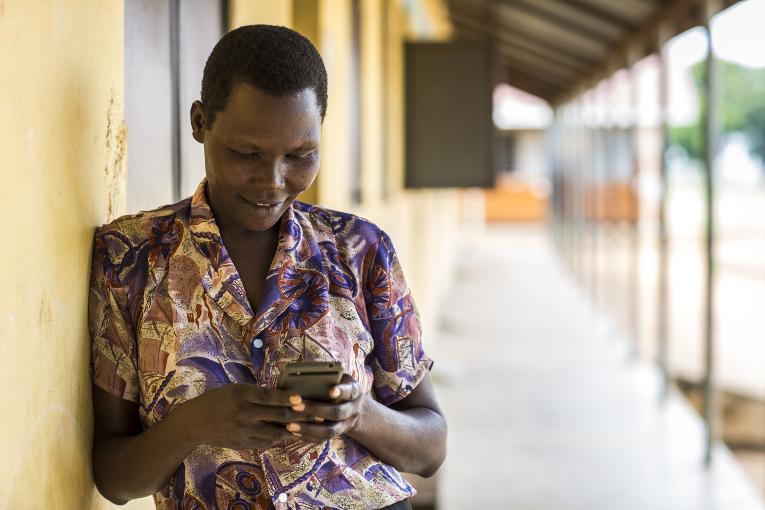
For teacher Sarah Atimaku, the biggest challenge at Pagirinya has been the language barrier between Ugandans and the South Sudanese. She herself speaks the language spoken by the South Sudanese, Arabic, and mobile mentoring has given her advice on how to help them follow the teaching in English.
Dialogue brings teachers together
In two years, FCA has offered mobile mentoring to a total of 120 teachers in Adjumani and Moyo. The teachers work in schools with both Ugandan and South Sudanese pupils.
The teachers go through teacher training provided by FCA in Uganda. They learn things such as pedagogy, acknowledging pupils’ special needs, and developing a curriculum. The learning is supported by Whatsapp groups, with a Finnish mentor giving advice to a set number of Ugandan teachers.
The Finnish teachers have also turned out to be active and committed to dialogue, says Roosa Laine, volunteer with the FCA-coordinated Teachers Without Borders network in Adjumani.
”They have also encouraged the teachers to ask questions. In addition, the dialogue has inspired the Ugandan teachers to collaborate more actively at school while planning their teaching,” says Laine.
”The programme has clearly increased these teachers’ pride in their profession.”
Mobile phones off during classes
The Whatsapp groups are not used for messaging while teaching a class, but during breaks between classes, urgent support is also available, depending on the mentor. Anguezaru’s group exchanges messages on a daily basis.
According to her, teachers may even record their classes to be assessed by others. For example, she has exchanged messages with Auli from Finland about the challenges she faced during geometry classes.
”I can say ‘hey, I’m having trouble with how to teach this topic.’ At the end of the school day, I can tell Auli how her advice worked,” says Anguezaru.
According to Anguezaru, the mentoring has clearly improved pupils’ performance at Pagirinya. She feels especially motivated by the change in the school’s atmosphere.
”The pupils have become very friendly, and I treat them like my friends. No one is left on their own.”
Text: Erik Nyström, Photos: Patrick Meinhardt
In Kenya’s poorest region, going to school requires great sacrifices, but David Edapal is convinced that education guarantees his daughter a good future.
There is a rustle of dry twigs as goats try to make their way out of their pen through narrow openings. 12-year-old Rebecca Atubo carefully guides baby goats into their own cage before letting the adult goats loose. Soon, the goats are ambling towards pastures in the gentle early-morning sun.
In a few hours, the temperature rises and turns to relentless heat, and it is hard to find shade in the desert-like environment.
”Herding is hard work when it’s so hot, and you’re thirsty all the time,” Rebecca describes.
Still, Rebecca is obedient and does what is asked of her.
For thousands of years, the nomadic people of Northwest Kenya have made their living raising cattle, and children have taken responsibility for the family’s goats and cows at a young age.
However, the distance to pastures has grown longer. There is no green in sight in the yellowish-gray landscape outside the family’s huts. Rebecca’s father David Edapal has been worried for a long time. He cannot say how old he is, but the lines on his face reveal he has seen several decades in Turkana, the poorest county in Kenya.
”The weather has grown warmer, and there are much fewer rains than before. In order to get water, we have to walk for two hours one way every day to get to the nearest river,” says Edapal.
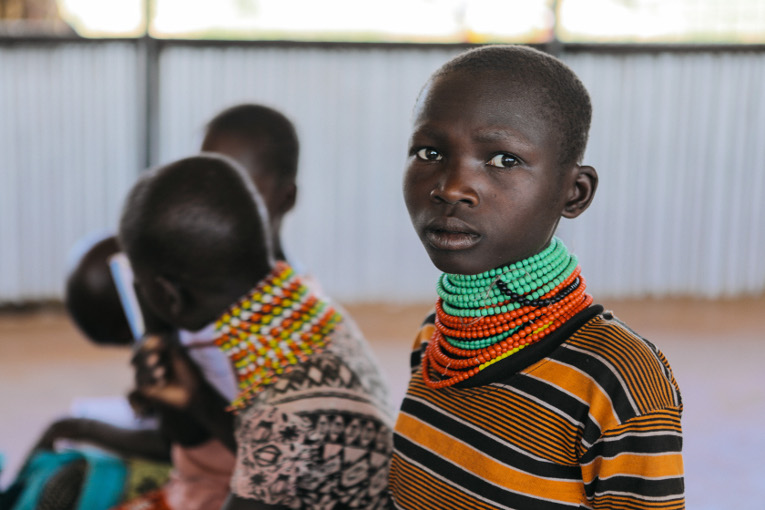
Rebecca says she prefers school to herding. Because of the heat, herding is hard work for both children and adults, and according to Rebecca, the thirst is the worst part.
Tested by drought
Severe periods of drought are testing Turkana more and more frequently. The drought in 2017 was the worst in decades. Hundreds of thousands of animals died due to lack of water as well as diseases.
This was a hard blow for the pastoralists, who traditionally move to follow the rains. Livestock are like a bank account on legs – they are used to fulfil all needs. Livestock provide milk and meat for food. Selling livestock brings in money to pay for things such as healthcare.
In addition, men need livestock to pay dowry to the family of the bride when they get married. The death of livestock hit families like an economic recession.
”Animals ravaged by drought cannot be sold or eaten, and they provide much less milk,” Edapal explains.
The crisis also fuels tensions among pastoralist people. They compete for the shrinking pastures, and extreme poverty makes stealing cattle a tempting prospect. A camel shepherd passing by carries an assault rifle on his shoulder to keep thieves at bay. Adding to the insecurity is a stream of firearms coming to Turkana across the border from neighbouring war-torn South Sudan.
For a pastoralist, questions about property are about as personal as asking a Finn about their salary. Most keep the number of livestock to themselves. However, Edapal reveals that cattle thieves took about two hundred of the family’s animals.
The family fled the insecurity into their current place of residence in the village of Ageles near the town of Lokichar. Edapal’s wife Aseken Namasi says all their hardships hurt her heart.
”The worst moment was when thieves killed four of my friends in front of my eyes when I was retrieving water,” she says. ”You can always get more livestock, but you can never replace a human being.”
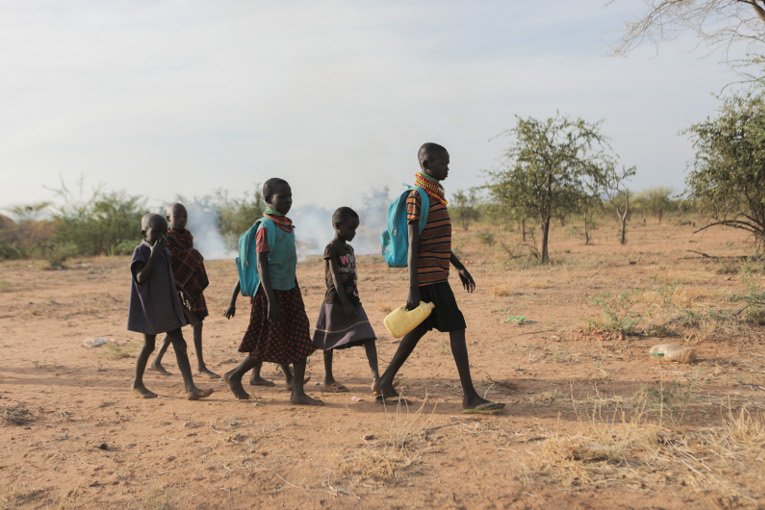
Rebecca Atubo, 12, (in front) walking to school with her friends. It is important to have the school close to home, as the journey to school is filled with danger in Turkana.
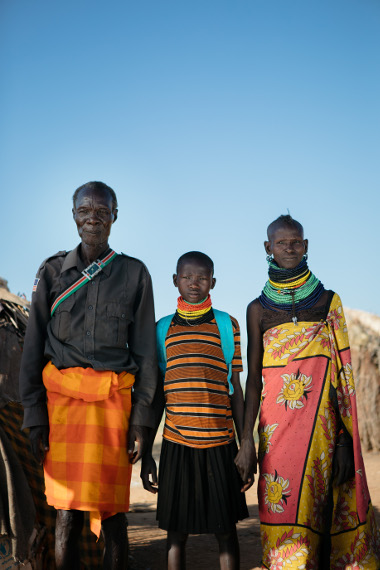
12-year-old Rebecca Atubo’s (middle) parents David Edapal (left) and Aseken Namasi sent their daughter to school. The shift from nomadic culture to a view of life that values education is seen strong in Turkana.
Almost all inhabitants of Turkana are pastoralists. Boys are brought up to raise cattle, and girls are expected to add to the family’s wealth by marrying. The dowry goes to the entire extended family.
Child marriage is still common. Because of the expectations of the traditional lifestyle, pastoralist people used to have little respect for education.
When Alice Loro Lele got to school age, her mother wanted her to go to school, but her father resisted. In anger, her father threw them both out, and with no livestock, they were destitute.
After comprehensive education, Alice could not afford to go to high school. Today, Alice is a 20-year-old mother of three, and lives in a hut in Lokichar with her mother.
”I married at 15, because I thought my husband would take care of us. I was foolish, and I didn’t know much about anything,” Alice says, clearly upset.
Her husband never paid dowry, which is another example of the plight of the nomadic people. As a gifted student, Alice got a job as a preschool teacher. She also started a general store. But her husband kept all the profits and started drinking. Alice gave birth to two children, but her husband did not care about them.
”When I was pregnant for the third time, my husband was going to get a second wife. I left him and moved back in with my mother,” Alice says.
Turkana lives under the poverty line
Places like Turkana are far from the reality of the capital Nairobi. Kenyan economy has grown at a rapid pace. Nairobi is teeming with skyscrapers, technology, and innovative mobile phone applications. In Turkana, most people live in villages with no electricity or running water.
In Nairobi, 22 percent of the people live under the poverty line, while in Turkana, the number is 88 percent. The disparity is largely due to education. In Nairobi, almost everyone has at least completed comprehensive school – in Turkana, 18 percent.
Pastoralists are moving into towns of Turkana with hope of work, but few of them even know how to read.
”We encourage families to send their children to school. More and more people see this as a solution in the long term,” says FCA education coordinator Miriam Atonia.
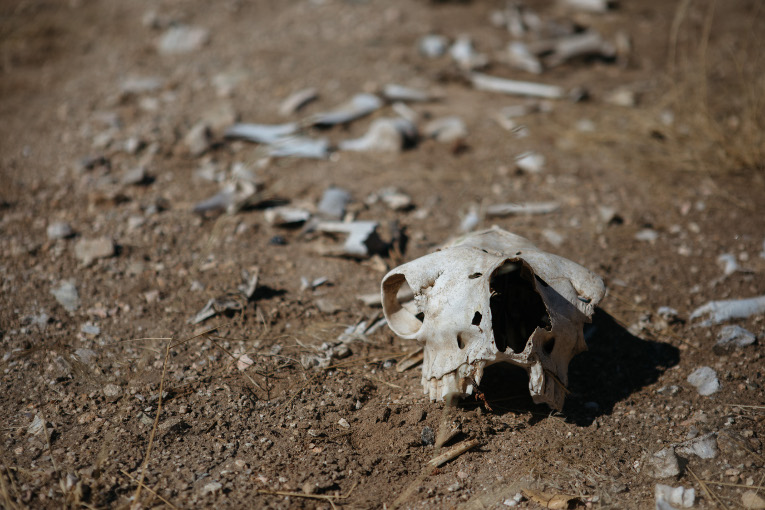
Hundreds of thousands of animals died during the drought of 2017. The drought had catastrophic repercussions for the nomadic people whose livelihood depends on raising cattle.
Things are moving in the right direction. Today, over half of the school-aged children and young people in Turkana go to school. Almost 27,000 started school in the poorest counties in Kenya in FCA projects during 2018.
Alice was offered a scholarship to study at a high school in Lokichar. She also thanks her mother for her support: mother looks after Alice’s children while she is at school.
”My heart breaks because I see my children so rarely. But we have to make some sacrifices; if we’re idle, we can’t improve our situation,” she says.
”I want to become a teacher because I want to encourage girls to go to school. I can give them the kind of advice I needed myself.”
It is hard to communicate the benefits of education to parents who have led a nomadic life. Edapal and Namasi did not go to school, but after a great deal of consideration, they decided to send their daughter Rebecca off to get an education.
”I have seen how the people of my generation, those who went to school, are succeeding. If we had received an education, we would be sleeping on mattresses, and our hut would have a tin roof instead of cloth,” he muses.
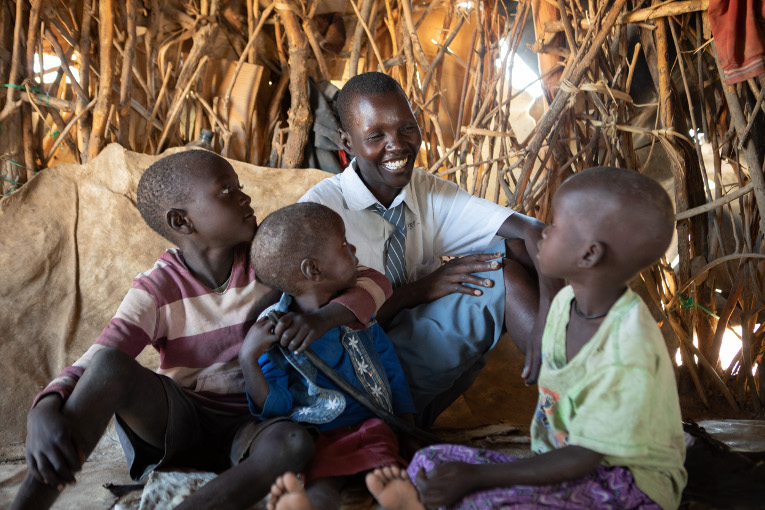
Alice Loro Lele (left) goes to school and takes care of her three children. She happy, that she decided to return to school.
A woman with an education is independent
After letting the goats out to pasture, it only takes Rebecca a few minutes of walking to get to the first lesson of the day. Edapal compares education to marriage – Rebecca is now married to school. An educated woman does not need to depend on others. She can make her own decisions regarding marriage once she is has finished her schooling.
Edapal feels proud when after her school day, Rebecca tells him about what she has learned.
”I hope Rebecca finds herself a job she likes, and God willing, can even help her parents in the future. Education provides lots of opportunities which I can’t even imagine.”
Text: Erik Nyström, Translation: Elina Vuolteenaho, Photos: Tatu Blomqvist / Ville Nykänen
Take part in the Common Responsibility Campaign at yhteisvastuu.fi, In addition, see the touching TV documentaries on the Yle channels starting from the beginning of February.



















